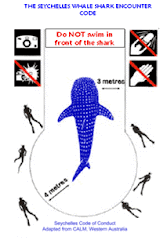Well it’s that time of year once again and while most people are looking forward to their New Year’s eve parties a small contingent are beginning to make their way towards a tiny corner of north east Africa named Djibouti, to take part in what is becoming the annual whale shark monitoring programme.

So what’s so special about Djibouti? Well apart from the fact that its one of the few places globally where whale sharks aggregate seasonally, Djibouti’s claim to fame is that the sharks found here are significantly smaller than in the aggregations found in most other areas with an average size below 4 metres.
The programme has its origins with the volunteers of Megaptera who with help from MCSS formed a local non-governmental organisation, the Marine Conservation Society Djibouti (MCSD) to research and conserve the whale shark aggregation. MCSD has now merged with DECAN, a land based NGO who are known for their work on rescuing Cheetahs and other wild-cats in the area, and who still support the whale shark programme.
The programme has its origins with the volunteers of Megaptera who with help from MCSS formed a local non-governmental organisation, the Marine Conservation Society Djibouti (MCSD) to research and conserve the whale shark aggregation. MCSD has now merged with DECAN, a land based NGO who are known for their work on rescuing Cheetahs and other wild-cats in the area, and who still support the whale shark programme.

Luke, Katie (last years team leaders) with David at the DECAN Cheetah Sanctuary last year
This year Dr. David Rowat from MCSS will be assisted by two new team leaders Abi March and Ciara McCarten who volunteered to assist having completed the Seychelles internship programme this past summer. As such they will be helping to teach the skills needed for photo ID and environmental monitoring to participants in the programme.
This year there is a large contingent of participants from the Arabian peninsula in the form of Jonatahn Ali Khan and his team making a documentary for Shark Quest Arabia along with various members of the newly formed Arabian Whale Shark Research Programme who will be learning the field skills they need to monitor whale sharks in their own areas.

The first whale shark research expedition to Djibouti back in 2006 was an interesting mission with a surprising number of sharks encountered; the second in January 2009 was mind-blowing in the sheer number of sharks found.... but an Italian trip just two weeks later found very few sharks...
So there are no guarantees and its difficult to tell exactly what we will find but we will do our best and try to upload updates to our blog as we get the chance!
So fingers crossed...... Djibouti and 2010 here we come!!
This year there is a large contingent of participants from the Arabian peninsula in the form of Jonatahn Ali Khan and his team making a documentary for Shark Quest Arabia along with various members of the newly formed Arabian Whale Shark Research Programme who will be learning the field skills they need to monitor whale sharks in their own areas.

The first whale shark research expedition to Djibouti back in 2006 was an interesting mission with a surprising number of sharks encountered; the second in January 2009 was mind-blowing in the sheer number of sharks found.... but an Italian trip just two weeks later found very few sharks...
So there are no guarantees and its difficult to tell exactly what we will find but we will do our best and try to upload updates to our blog as we get the chance!
So fingers crossed...... Djibouti and 2010 here we come!!







